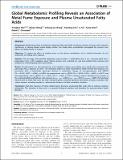Global Metabolomic Profiling Reveals an Association of Metal Fume Exposure and Plasma Unsaturated Fatty Acids

View/
Author
Chang, Chiung-yu
Chen, Feng
Published Version
https://doi.org/10.1371/journal.pone.0077413Metadata
Show full item recordCitation
Wei, Yongyue, Zhaoxi Wang, Chiung-yu Chang, Tianteng Fan, Li Su, Feng Chen, and David C. Christiani. 2013. “Global Metabolomic Profiling Reveals an Association of Metal Fume Exposure and Plasma Unsaturated Fatty Acids.” PLoS ONE 8 (10): e77413. doi:10.1371/journal.pone.0077413. http://dx.doi.org/10.1371/journal.pone.0077413.Abstract
Background: Welding-associated air pollutants negatively affect the health of exposed workers; however, their molecular mechanisms in causing disease remain largely unclear. Few studies have systematically investigated the systemic toxic effects of welding fumes on humans. Objectives: To explore the effects of welding fumes on the plasma metabolome, and to identify biomarkers for risk assessment of welding fume exposure. Methods: The two-stage, self-controlled exploratory study included 11 boilermakers from a 2011 discovery panel and 8 boilermakers from a 2012 validation panel. Plasma samples were collected pre- and post-welding fume exposure and analyzed by chromatography/mass spectrometry. Results: Eicosapentaenoic or docosapentaenoic acid metabolic changes post-welding were significantly associated with particulate (PM2.5) exposure (p<0.05). The combined analysis by linear mixed-effects model showed that exposure was associated with a statistically significant decline in metabolite change of eicosapentaenoic acid [(95% CI) = −0.013(−0.022∼−0.004); p = 0.005], docosapentaenoic acid n3 [(95% CI) = −0.010(−0.018∼−0.002); p = 0.017], and docosapentaenoic acid n6 [(95% CI) = −0.007(−0.013∼−0.001); p = 0.021]. Pathway analysis identified an association of the unsaturated fatty acid pathway with exposure (pStudy−2011 = 0.025; pStudy−2012 = 0.021; pCombined = 0.009). The functional network built by these fatty acids and their interactive genes contained significant enrichment of genes associated with various diseases, including neoplasms, cardiovascular diseases, and lipid metabolism disorders. Conclusions: High-dose exposure of metal welding fumes decreases unsaturated fatty acids with an exposure-response relationship. This alteration in fatty acids is a potential biological mediator and biomarker for exposure-related health disorders.Other Sources
http://www.ncbi.nlm.nih.gov/pmc/articles/PMC3797131/pdf/Terms of Use
This article is made available under the terms and conditions applicable to Other Posted Material, as set forth at http://nrs.harvard.edu/urn-3:HUL.InstRepos:dash.current.terms-of-use#LAACitable link to this page
http://nrs.harvard.edu/urn-3:HUL.InstRepos:11878835
Collections
- HMS Scholarly Articles [17922]
- SPH Scholarly Articles [6362]
Contact administrator regarding this item (to report mistakes or request changes)


